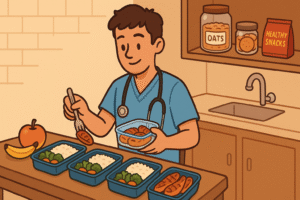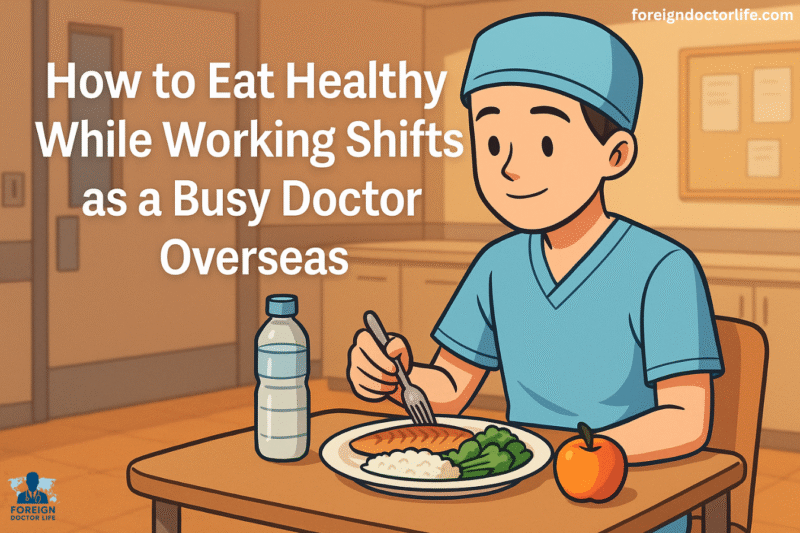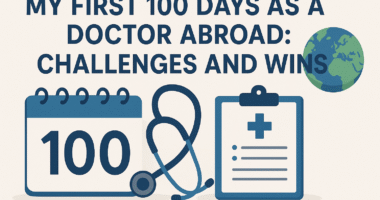Long shifts, unpredictable hours, and late-night hunger are a familiar part of hospital life — especially when you’re far from home. When I first started working overseas, I realized how easily healthy eating could slip through the cracks. Between adapting to new hospital systems, adjusting to tropical weather, and missing home-cooked meals, it became difficult to eat healthy while working shifts.
Over time, I found small, practical ways to manage nutrition during shifts without strict diets or fancy ingredients. These habits not only kept my energy stable but also helped me feel more grounded in a new country.
In this post, I’ll share what’s worked for me — simple strategies to help you eat healthy, stay energized, and maintain balance as a doctor working abroad.
🩺 Why Healthy Eating Matters for Shift-Working Doctors
As doctors, we know the science — poor nutrition leads to fatigue, brain fog, and weaker immunity. But when we’re the ones doing 12-hour shifts, those healthy choices often become the first thing to go.
Working abroad adds another layer: unfamiliar food, new routines, and sometimes, limited access to healthy options. Yet, eating right directly affects our focus, emotional stability, and even how we respond to stress.
🌍 Common Challenges When Eating Healthy Abroad
When I moved to the Maldives, I thought tropical fruits would make eating healthy easier. Instead, I found new challenges waiting for me.
-
Irregular meal timing — emergencies often delay meals for hours.
-
Limited healthy options — canteens are filled with rice, curries, and fried snacks.
-
Energy crashes — coffee becomes a crutch instead of a boost.
-
Local food adaptation — learning what’s nutritious versus heavy or salty.
-
Hydration neglect — in hot climates, dehydration creeps in fast.
-
No time to cook — hospital shifts leave little energy for full meal prep.
If you’ve faced any of these, you’re definitely not alone.
(Related reading: How I Manage Stress as a Doctor Working Overseas)
🍱 My Practical Strategies to Eat Healthy While Working Shifts
Here’s what helped me create a healthier rhythm, one small step at a time.

1. Plan Ahead and Meal Prep in Small Batches
You don’t need an elaborate prep day — just a bit of structure.
I cook two simple dishes every few days: grilled fish or boiled chicken, plus a mix of rice and vegetables. Having one ready container means I won’t reach for fast food during breaks.
If you have limited storage, dry foods like oats, nuts, and canned tuna are lifesavers.
Keep healthy snacks at your locker — it removes the decision fatigue after long duties.
“I realized that willpower fades after 10 hours on call. Preparation doesn’t.”
2. Choose Smarter Cafeteria Options
Even with limited choices, small swaps make a difference:
-
Go for grilled or boiled instead of fried.
-
Add salads or soups whenever available.
-
Choose water or plain tea instead of soft drinks.
When local dishes are carb-heavy, reduce portions and add fruits later. You can still enjoy local meals — just balance them wisely.
(Related: How to Adapt to New Hospital Systems Quickly)
3. Snack Smart During Long Shifts
Instead of chips or sugary biscuits, I keep:
-
Almonds or cashews
-
Greek yogurt
-
Bananas or apples
-
Whole-grain crackers
These are quick, mess-free, and prevent the post-coffee crash. According to the World Health Organization’s healthy diet guidelines, snacks rich in fiber and protein help sustain energy better than refined carbohydrates.
4. Stay Hydrated — Especially in Tropical Climates
Water sounds basic, but it’s the most overlooked habit.
I keep a 1-liter bottle on my desk and aim to refill it three times per day.
During night shifts, coconut water helps replace electrolytes naturally.
Limit coffee to before 6 p.m. — caffeine too late can disrupt sleep cycles even after exhausting shifts.

5. Adjust to Local Food Mindfully
Living abroad doesn’t mean avoiding local cuisine — it’s about balance.
In the Maldives, I enjoy mashuni (a tuna-coconut breakfast dish) or rihaakuru with rice. They’re nutritious and packed with protein.
Learn the healthy versions of local staples. You’ll enjoy your environment more while keeping your meals balanced.
If you’re in Southeast Asia, explore fresh markets — local fruits and fish are often cheaper and cleaner than processed imports.
⚡ Foods That Keep Me Energized on Duty
| Meal Type | Example | Why It Works |
|---|---|---|
| Morning Shift | Oats + fruit + boiled egg | Balanced energy without sugar spikes |
| Midday Break | Rice + grilled fish + salad | Protein + fiber keeps you full longer |
| Night Duty | Yogurt + mixed nuts | Light yet sustaining |
| Hydration | Coconut water or lemon water | Replaces lost electrolytes |
(You might also like: Simple Evening Routines That Help Doctors Recharge)
🚫 What to Avoid During Long Hospital Shifts
It’s not just what we eat, but what we avoid that keeps us sharp.
-
Too much caffeine — causes jitteriness and dehydration
-
Sugary snacks — energy crash within 30 minutes
-
Heavy meals before sleep — leads to poor rest and bloating
-
Skipping meals — worsens mood and focus
Once I cut down on late-night instant noodles and replaced them with fruit and yogurt, I woke up lighter and more focused the next day.
🔁 Building Consistency When You’re Always Busy
Your shifts may rotate, but your nutrition habits can still stay consistent.
-
Keep a default meal plan (e.g., banana + yogurt for breakfast).
-
Carry one healthy backup snack in your bag daily.
-
Track how different foods affect your mood and focus.
Most importantly, be kind to yourself. You won’t eat perfect every day — and that’s okay.
The goal is to feel better, not to follow a strict diet.
“Progress, not perfection, is what keeps you healthy abroad.”
❓ Frequently Asked Questions (FAQ)
What are the best quick meals for night shifts?
Greek yogurt, nuts, boiled eggs, or light rice dishes work well. Avoid sugary or fried foods close to midnight.
How can I eat healthy if I live in staff housing?
Stock non-perishables like oats, canned beans, and nuts. Use a mini rice cooker or electric kettle to prepare simple meals.
What’s the best time to eat after a night duty?
A light meal within an hour before sleeping — like soup or fruit — prevents reflux and helps sleep better.
How do I avoid weight gain during shift work?
Plan balanced meals, avoid skipping breakfast after night shifts, and walk a few minutes after each meal when possible.
🌱 Final Thoughts
Working shifts overseas will always be demanding, but you don’t have to sacrifice your health to do it well.
Start with one habit: bring your own meal, drink enough water, or choose one healthy snack during your shift. Over time, these small decisions become automatic — and that’s how you build real balance.
Eating healthy isn’t about control; it’s about care — for yourself, your body, and the patients who depend on your best energy every day.










2 comments
Thanks for sharing knowledge ✨